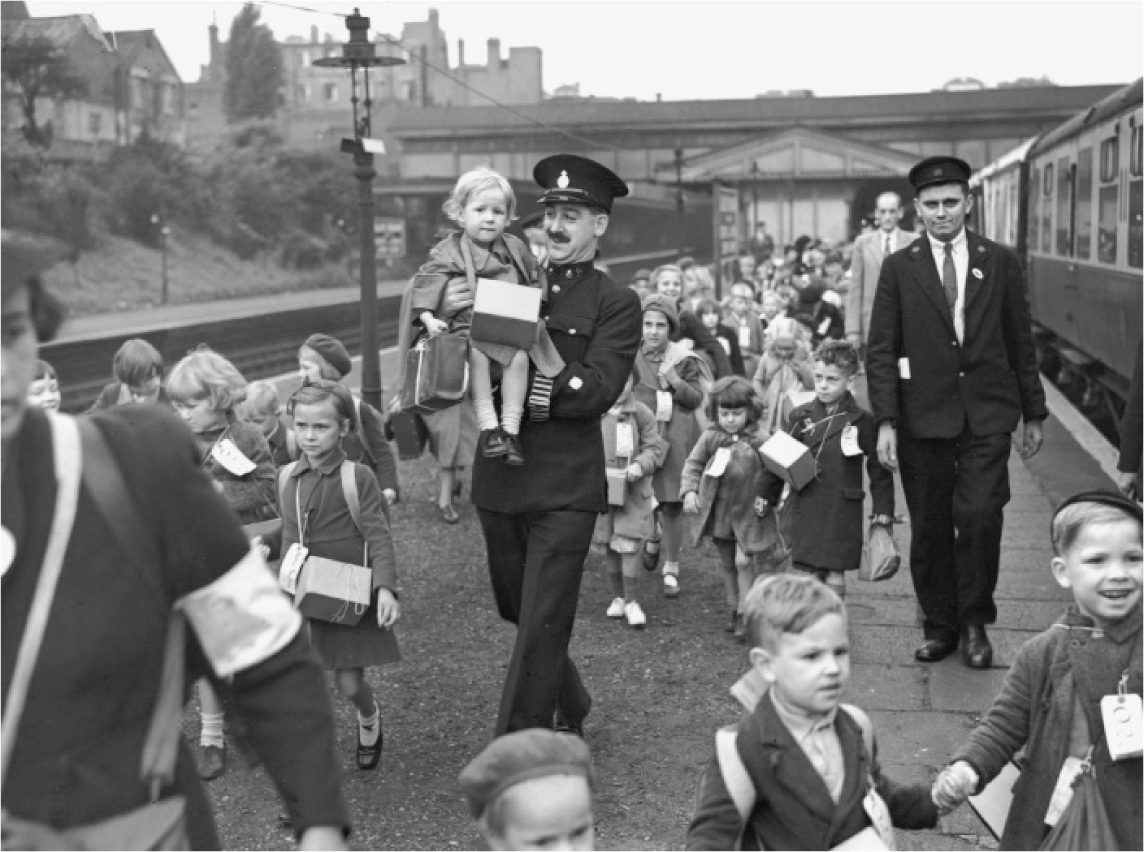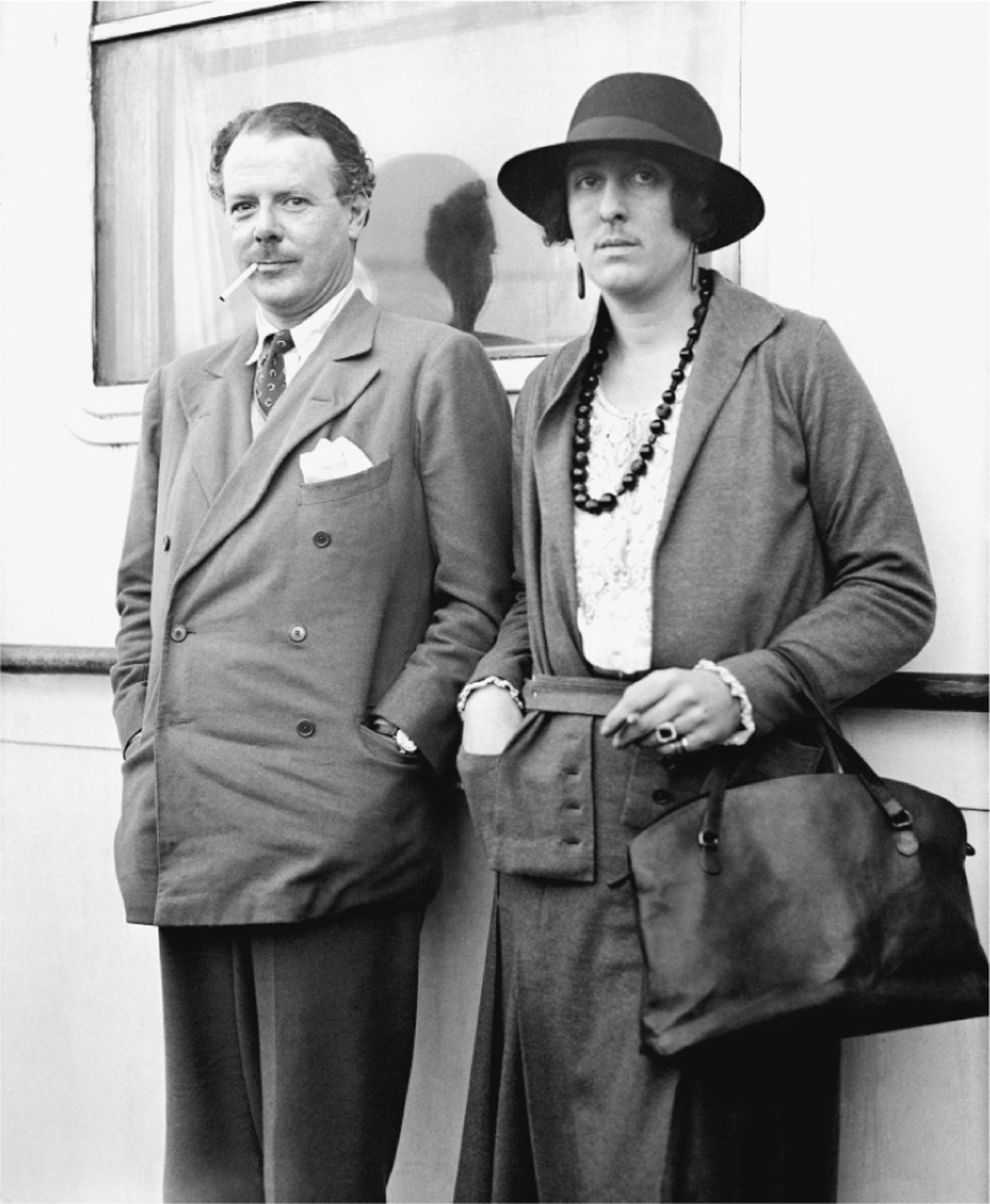
Children being evacuated, 1939 (note gas masks).

Children being evacuated, 1939 (note gas masks).
AT OUR HOME in Hampstead it almost seemed as if we were still at peace in the spring of 1940. The lilac tree at the far end of the garden was in full bloom, my father went off to the London Films studio at Denham early every morning, chauffeured, much to his dislike, since my uncle Alex had no confidence in his driving ability,* and my mother was in a play in the West End, and slept until late in the morning and seldom got home before midnight. On the rare occasions when their paths collided, they quarreled. At the time I had no idea why, but seventy-six years later it is clear enough to me—Alex had lost control of the London Films studio at Denham, the largest and most ambitious in Europe, after his financial backer the Prudential Insurance Company lost nearly three million pounds, and he was also trying to gain control of United Artists in Los Angeles, in which he was a partner. At the same time he was working on the three very expensive pictures, The Thief of Baghdad, Jungle Book, and That Hamilton Woman, the last a carefully disguised propaganda film that Alex had promised Winston Churchill he would make. Alex was near the height of his career, but he was also deeply mired in debt, his marriage to Merle Oberon was fragile, and he was faced with the fact that in wartime England there was little or no hope that these three ambitious productions, two of them in Technicolor, at that time a hugely complicated and expensive procedure, could be completed. It was clear to him—and was soon made clear to his brothers, Zoltan (usually called Zoli) and Vincent—that the entire family might have to be uprooted and moved to Hollywood, all the more so since two of the most “bankable” stars under contract to London Films, Laurence Olivier and Vivien Leigh, whom he would need to play Admiral Nelson and Lady Hamilton, were already there. That is not to say that my mother and my aunt Joan, Zoli’s wife, were reconciled to being moved suddenly five thousand miles away—and in my mother’s case away from a successful London stage career. Alex, Merle, and Zoli, on the other hand, were in that rare class of people in those days who already moved effortlessly back and forth between London, New York, and Los Angeles, either making the Atlantic crossing on one of the great liners or, in Alex’s case, flying from London to Lisbon to take the Pan American “Clipper” flying boat to New York, then crossing the United States in a TWA DC-3, in those days a trip of eighteen hours, with refueling stops in Chicago, Kansas City, and Albuquerque. At one point Alex flew from London to Los Angeles and back twice in three weeks for United Artists board meetings, a feat something on the order of Jules Verne’s Around the World in Eighty Days in 1940.
What Alex did not tell his sisters-in-law was that the move to California had the blessing of MI6 and Churchill, or that the British government was clandestinely helping to finance the move. Albeit at the most privileged and luxurious level, we were about to become refugees like so many others set adrift by the war, but without much in the way of discomfort or real danger.
Seen from the United Kingdom and France, the autumn and winter of 1939–1940 was indeed a “phoney war.” The anticipated bombing of London did not take place, and the RAF was still strictly limited to dropping propaganda leaflets over Germany by night. Hitler’s broadcast “peace offers” were ignored or ridiculed in public, but behind the scenes in the War Cabinet and the Foreign Office (and the French equivalents) they were examined rather more seriously. The small irritations of rationing and government regulations constituted the principal proof that we were at war.
The familiar British reply to “How are you?,” which is “Mustn’t grumble,” was falling into disuse. Everybody had something to grumble about, and did. People grumbled about rationing, which though it was not as draconic as it was soon to become, included everything from tobacco and “sweets” to meat and eggs. They grumbled about the many inconveniences of “the blackout” as urban crime, prostitution, and accidents soared in the darkness of the streets, and about “petrol rationing,” which soon took almost every car off the road except those owned by doctors, farmers, and other special categories. The poor grumbled that the rich still ate at their club or at expensive restaurants where, at a price, food remained plentiful, while the rich grumbled about taxes.
Outside the big cities, the poor and the rich both grumbled about the evacuation of “slum” children to the countryside, under Operation Pied Piper, the ambitious prewar plan (improbably concocted by the Conservatives) intended to protect them from being bombed, and which went forward inexorably, despite protests from villagers and country dwellers throughout England. There was almost as much protest from the families of the urban poor at having their lives disrupted by what was perceived as a vast—and possibly half-baked—social experiment. Evelyn Waugh wrote a whole satiric novel about it, Put Out More Flags, and the normally urbane Harold Nicolson commented in his diary, “Many of the children are verminous and have disgusting habits. . . . Much ill feeling has been caused.”

Harold Nicolson and Vita Sackville-West.
In the end almost three and a half million would be evacuated, most of them before the bombing started, in a scheme that seemed more in keeping with social planning in the Soviet Union than in Great Britain. In practice the urban poor were sent to the English countryside, where people naturally attempted to procure the more attractive and docile of the children by fair means or foul, while much smaller numbers of upper-class and middle-class children were evacuated to Canada or the United States, often sponsored by well-meaning organizations and individuals, and parked there for the duration of the war.† Anna Freud, the daughter of Sigmund Freud, later studied the effects of evacuation in 1941 and reached the unsurprising conclusion that “separation from their parents is a worse shock for children than a bombing.”
All this grumbling would cease when the phoney war was over and the fighting and bombing began in earnest, a reflection of the British people’s peculiar ability to draw together when under direct threat, and to lower the level of class warfare—the normal preoccupation of the nation—at least briefly, when faced with real danger. The German belief that Schrecklichkeit—the application of frightfulness on a large scale, long the default position of Germany in dealing with the rest of the world—would shatter the British will was a serious misreading of the national character. Instead, it would momentarily unite us all by giving us something to hate more than those who were richer or poorer on the social scale, or who spoke with a different accent.
The evacuation of children was hard to avoid then, given the determination with which the bureaucracy enforced it, and London railway stations soon became the chaotic scenes of tearful partings between parents and children, rather than the tearful farewells to those going off to war, as had been the case in 1914. It was as if the British government and the civil service had decided to put their major war efforts into the disruption of British home life, rather than creating the divisions that would be needed in France. If they could not create well-armed new divisions of troops, they could at least shuffle children around the country in huge quantities according to a complex scheme that was unclear even to those who were administering it.
In my case, being among the socially priviledged, I was for the time being kept out of the hands of officialdom, first sent to live up north with Nanny Low’s family on a windswept farm in Yorkshire, of which I remember only pigs, driving rain, and a local accent so pronounced that I would not have understood a word that was said to me had my maternal grandfather, a prosperous dentist in suburban London, not been “from the North” himself. From there I was eventually moved in a journey of unthinkable length and seemingly infinite changes of train to a red-brick boarding school on the Isle of Wight, along with a batch of other middle- and upper-class London evacuees of my age, all clad in identical gray flannel shorts, jackets, and caps, and all desperately homesick. This was a curious place to have sent evacuated children, since if the Germans ever attempted to invade England the Isle of Wight would surely have been high on the list of places where they could be expected to land.
Apart from acquiring a lifelong dislike of the smell of cabbage being boiled, I remember little about this episode except seeing barbed wire unrolled on the beaches, which were guarded at intervals by soldiers, many of them sitting on the peacetime canvas deck chairs holding their rifle and looking out to sea. One or two of them, I still recall, sensibly held an umbrella in the other hand to shield them from the rain.
As it gradually became apparent that Armageddon was not about to pour down out of the skies on London for the moment, despite H. G. Wells’s prediction, the long arm of the Korda family eventually reached out and placed me back in our home in Hampstead, none the worse for wear, except for a strong dislike of English boarding schools.
_________________________
* Like many people born in the age of the horse, neither of my father’s brothers learned how to drive. My father did, in midlife, and remained an enthusiastic but terrible driver well into old age, going straight down the middle of the road slowly and in low gear to the fury of other drivers, and signaling for a turn a mile before he reached it.
† Among those evacuated to the United States by way of Canada were my friends Martin Gilbert, the future official biographer of Winston Churchill, Alistair Horne, who was sent to the Millbrook School, in Millbrook, NY (where his roommate was William F. Buckley), and who would go on to become Sir Alistair Horne, CBE, the respected historian, and myself.